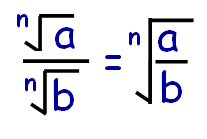MULTIPLICATION AND DIVISION OF SURDS
Subscribe to our ▶️ YouTube channel 🔴 for the latest videos, updates, and tips.
How to multiply surds ?
Whenever we have two or more radical terms which are multiplied with same index, then we may put only one radical and multiply the terms inside the radical.

How to divide surds ?
Whenever we have two or more radical terms which are dividing with same index, then we can put only one radical and divide the terms inside the radical.

Let us look into some examples based on addition and subtraction of surds.
Example 1:
Simplify the following √5 ⋅ √18
Solution :
= √5 ⋅ √18
According to the laws of radical,
= √(5 ⋅ 18)
= √(5 ⋅ 3 ⋅ 3 ⋅ 2)
= 3 √(5 ⋅ 2)
= 3√10
Example 2 :
Simplify the following ∛13 ⋅ ∛5
Solution :
= ∛13 ⋅ ∛5
According to the laws of radical,
= ∛(13 ⋅ 5) = ∛65
Example 3 :
Simplify the following ∛7 ⋅ ∛8
Solution :
= ∛7 ⋅ ∛8
According to the laws of radical,
= ∛(7 x 8) ==> ∛(7 ⋅ 2 ⋅ 2 ⋅ 2) ==> 2 ∛(7 ⋅ 2) ==> 2 ∛14
Example 4 :
Simplify the following ∜32 ⋅ ∜8
Solution :
= ∜32 ⋅ ∜8
= ∜(32 ⋅ 8)
= ∜(2 ⋅ 2 ⋅ 2 ⋅ 2 ⋅ 2 ⋅ 2 ⋅ 2 ⋅ 2)
= (2 ⋅ 2)
= 4
Example 5 :
Simplify the following 3√35 ÷ 2√7
Solution :
= 3√35 ÷ 2√7
According to the laws of radical,
= (3/2) √(35/7) ==> (3/2)√5
Example 6 :
Simplify the following 15√54 ÷ 3√6
Solution :
= 15√54 ÷ 3√6
According to the laws of radical,
= (15/3)√(54/6)
= (15/3)√9
= (15/3) ⋅ 3 = 15
Example 7 :
Simplify the following ∛128 ÷ ∛64
Solution :
= ∛128 ÷ ∛64
According to the laws of radical,
= ∛(128/64)
= ∛2
Example 8 :
Simplify the following ∜8 ⋅ ∜12
Solution :
= ∜8 ⋅ ∜12
According to the laws of radical,
= ∜(8/12)
= ∜(2/3)
Example 9 :
Simplify the following 6∜16 ÷ ∜81
Solution :
= 6∜16 ÷ ∜81
= 6∜(16/81)
= 6∜(2 ⋅ 2 ⋅ 2 ⋅ 2)/(3 ⋅ 3 ⋅ 3 ⋅ 3)
Since we have the order 4, we have to to factor one term for every four same terms.
= 6 ⋅ (2/3)
= 2 ⋅ 2
= 4
Example 10 :
Simplify the following ∜256 ⋅ ∜81
Solution :
= ∜256 ⋅ ∜81
= ∜(256 ⋅ 81)
= ∜(4 ⋅ 4 ⋅ 4 ⋅ 4 ⋅ 3 ⋅ 3 ⋅ 3 ⋅ 3)
= 4 ⋅ 3
= 12
Related topics
- Rationalization of surds
- Comparison of surds
- Operations with radicals
- Ascending and descending order of surds
- Simplifying radical expression
- Exponents and powers
Subscribe to our ▶️ YouTube channel 🔴 for the latest videos, updates, and tips.
Kindly mail your feedback to v4formath@gmail.com
We always appreciate your feedback.
About Us | Contact Us | Privacy Policy
©All rights reserved. onlinemath4all.com

Recent Articles
-
US Common Core K-12 Curricum Algebra Solving Simple Equations
Jan 06, 26 04:54 AM
US Common Core K-12 Curricum Algebra Solving Simple Equations -
10 Hard SAT Math Questions (Part - 4)
Jan 05, 26 06:56 PM
10 Hard SAT Math Questions (Part - 4) -
10 Hard SAT Math Questions (Part - 3)
Jan 05, 26 06:34 PM
10 Hard SAT Math Questions (Part - 3)

